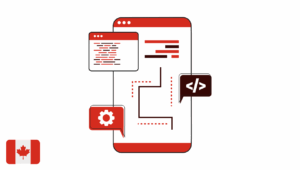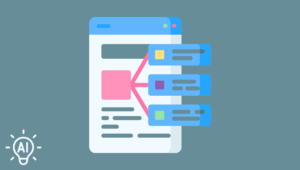The rapid evolution of technology means that Android app development is constantly changing, driven by emerging technologies and shifting user expectations. Understanding the latest trends ensures businesses and developers stay competitive, crafting apps that attract users and offer seamless functionality. In this article, we’ll explore Android app development trends: what you need to know, including the future of Android app development, best practices, and the technologies shaping this space.
1. The Shift Toward AI-Powered Apps
Artificial Intelligence (AI) has not only transformed the way mobile apps are built, but it has also empowered Android developers. They increasingly integrate AI tools like chatbots, recommendation engines, and voice assistants to enhance user interaction. Google’s AI-driven initiatives, such as Google Assistant and TensorFlow, make implementing innovative app features more accessible, giving developers more control and confidence in their work.
Impact on Android App Development
AI-based personalization, a key feature of AI-powered apps, ensures users stay engaged for longer. Apps like shopping platforms and streaming services rely on AI-powered algorithms to recommend products or content based on user behavior. Developers leveraging AI tools for personalization and automation will be better prepared for the future of Android app development, enhancing user engagement and app performance.
Pro Tip: Integrate AI with Android’s ML Kit to add face detection, text recognition, and natural language processing features. Keep reading top Android app development technologies.
2. Rise of Cross-Platform Development
Developers are increasingly embracing cross-platform frameworks like Flutter and React Native, not just because they’re backed by Google, but also because they allow developers to write code once and deploy it across multiple platforms, including Android and iOS. This trend not only reduces development time but also ensures consistency across devices, making developers feel more efficient and productive.
Why Cross-Platform Matters
The future of Android app development is not just about Android-specific solutions—it’s about building seamless experiences across ecosystems. Businesses that adopt cross-platform frameworks will save costs and streamline app maintenance while reaching broader audiences.
Best Practice: Use Flutter to leverage Google’s Material Design elements, ensuring your Android app feels native even on other platforms as Android app development technologies.
3. 5G Technology: Faster and Smarter Apps
The rollout of 5G technology, one of the most significant milestones in recent years, is fundamentally changing the way apps are designed. Ultra-fast connectivity and low latency mean developers can build apps that offer real-time streaming, AR/VR experiences. Moreover, advanced multiplayer gaming functionalities, ushering in a new era of app capabilities.
Impact on Android App Development
With 5G, developers can rethink app features previously limited by bandwidth and latency constraints. Apps focused on video streaming, IoT, and augmented reality will benefit the most from 5G adoption, offering users smoother, more interactive experiences.
Example: Streaming platforms can offer buffer-free 4K video, while gaming apps can enable real-time multiplayer sessions with minimal lag.
4. Android App Security: A Growing Priority
Security has always been a crucial aspect of app development, and with cyber threats evolving, Android developers need to stay ahead. Google is enforcing new Play Store policies to ensure that apps meet strict security standards. Privacy-first design is now a best practice for any Android development project. So, underscoring the growing importance of app security.
Best Practices for Android App Security
- Encryption: Firstly, secure user data with end-to-end encryption.
- Authentication: Secondly, implement two-factor authentication (2FA) for better security.
- Play Integrity API: Use Google’s Play Integrity API to protect against malicious activity.
- Regular Updates: Finally, ensure frequent updates to patch vulnerabilities.
Takeaway: Android development best practices now focus on security by design, ensuring privacy without compromising user experience.
5. The Growth of IoT-Integrated Apps
The Internet of Things (IoT) transforms industries by enabling smart devices to interact seamlessly with apps. Android developers are building apps integrating wearable technology, smart appliances, and home automation systems.
Key IoT Trends in Android Development
- Smart Home Apps: Firstly, apps controlling lighting, security, and appliances remotely.
- Wearables: Secondly, fitness apps integrating with Android Wear OS for health tracking.
- Connected Vehicles: Finally, avigation and entertainment apps for Android Auto.
Developers must now consider interoperability with multiple devices and provide consistent experiences across IoT ecosystems.
6. Low-Code and No-Code Platforms in Android Development
Low-code and no-code platforms are gaining popularity, enabling developers to build Android apps quickly without writing extensive code. These platforms are ideal for prototyping, allowing businesses to test app ideas before investing heavily in custom development.
How Low-Code Platforms Shape the Future of Android App Development
- Rapid Prototyping: Firstly, quickly create MVPs to test ideas.
- Non-Technical Teams: Secondly, business users can participate in app creation.
- Faster Time to Market: Finally, get apps live without lengthy development cycles.
Platforms like OutSystems and Adalo are paving the way for more accessible Android app development, especially for startups and small businesses.
7. Augmented Reality (AR) and Virtual Reality (VR) on the Rise
AR and VR technologies are no longer confined to gaming; they are now integrated into eCommerce, education, and healthcare apps. Google’s ARCore allows developers to build AR experiences that transform how users interact with apps.
How AR/VR Shape Android App Development
- Retail Apps: AR-powered virtual try-ons for clothes or makeup.
- Education Apps: VR-based virtual classrooms and immersive learning.
- Healthcare Apps: Telemedicine with VR consultations and AR diagnostics tools.
Developers need to experiment with AR/VR features that enhance app engagement to stay relevant.
8. Kotlin is the Preferred Programming Language
Google has officially endorsed Kotlin as the preferred language for Android app development. Its concise syntax, null safety features, and compatibility with Java make it a favorite among developers. More importantly, adopting Kotlin ensures future-proof development. So, making developers feel more secure and forward-thinking.
Why Kotlin Is Important for Android Development
- Improved Productivity: Write cleaner code with fewer lines.
- Fewer Errors: Avoid null pointer exceptions with built-in null safety.
- Backward Compatibility: Seamlessly integrate with existing Java code.
Best Practice: Adopt Kotlin for future-proof development while following Android development best practices.
9. Dark Mode and Adaptive Design
With Android users increasingly opting for dark mode, developers must implement adaptive UI themes that offer light and dark versions. Google encourages developers to build apps that adapt to system-wide dark mode settings. In conclusion, improving battery life and reducing eye strain for users.
Adaptive Design Tips for Android Developers
- Use Material Design Components: These adapt automatically to dark mode.
- Test on Multiple Devices: Ensure consistency across screens and resolutions.
- Enable User Control: Let users switch between light and dark modes.
Dark mode is more than a trend—it has become an essential feature for Android apps.
10. Continuous Delivery with DevOps
In the fast-paced world of Android development, continuous integration and delivery (CI/CD) are now integral to maintaining high-quality apps. Automating testing and deployment through DevOps practices ensures faster updates and a better user experience.
How DevOps Shapes Android App Development
- Automated Testing: Detect bugs early with automated test suites.
- Continuous Deployment: Deliver updates frequently without downtime.
- Version Control: Use tools like Git to manage code effectively.
Following DevOps practices ensures developers can deliver high-quality apps with fewer errors and keep users engaged with frequent updates.
Conclusion: The Future of Android App Development
Staying updated on Android app development trends is crucial for developers and businesses as technology evolves. The future of Android development is about more than just coding—it’s about embracing AI, 5G, cross-platform frameworks, and security best practices to build smarter, faster, and safer apps.
Key Takeaways:
- Adopt AI-powered tools to improve user experiences.
- Embrace cross-platform development for faster deployment.
- Ensure apps are 5G-ready to leverage fast connectivity.
- Follow best practices for security and data privacy.
- Use Kotlin and adaptive design to meet evolving user expectations.
By following these trends and Android development best practices, developers can position themselves at the forefront of innovation. The landscape will continue to evolve, and only those who keep up with the Android app development future will remain competitive. Stay curious, adapt to new tools, and explore emerging technologies to ensure your apps thrive in the coming years.








